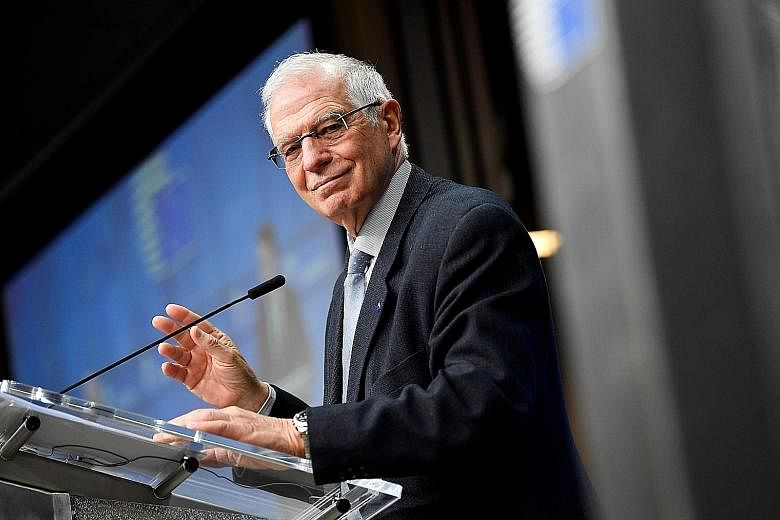BRUSSELS • EU foreign policy chief Josep Borrell was set to fly to Moscow yesterday to confront the Kremlin over the jailing of activist Alexei Navalny and a crackdown on protesters.
The visit - the first to Russia by a top European Union envoy since 2017 - has drawn criticism from European capitals worried that Moscow will see it as evidence that Brussels wants to return to business as usual.
But Mr Borrell insists he will deliver "clear messages" to the Kremlin despite it ignoring Western calls to release Navalny, President Vladimir Putin's most prominent critic who was sentenced to almost three years in prison this week.
"It is when things are not going well that you must engage," the former Spanish foreign minister said.
The EU's ties with Russia have been in the doldrums since Moscow seized Crimea and began fuelling the war in Ukraine in 2014.
Mr Borrell is eager to sound out his Russian counterpart Sergei Lavrov on the chances of cooperation on issues including enlisting Moscow's help in reviving the Iran nuclear deal and tackling climate change.
But it will be the jailing of Navalny and detention of thousands of Russian protesters that will dominate his visit.
Calls are growing in Europe for the EU to bulk up on sanctions it slapped on six Russian officials in October over the nerve agent poisoning that left Navalny fighting for his life in Germany.
EU foreign ministers last week agreed they would revisit the issue if he was not released. An EU statement said they would discuss "possible further action" on Feb 22.
Navalny himself has called for sanctions to hit the oligarchs and money men he accuses of protecting Mr Putin's wealth. But European diplomats say that any measures will likely target only officials and functionaries directly involved in the clampdown.
For Moscow, Mr Borrell's visit looks set to be used as a chance both to deflect from its own issues and show that the West still wants to talk to it regardless.
But with European leaders set to debate their approach to Russia at summits in the next few months, diplomats in Brussels say this is the right time to visit.
"There are reasons to go there to pass on messages," one European envoy said. "This mission is not a sign of weakness."
Meanwhile, a Russian court on Wednesday sentenced Sergei Smirnov, chief editor of Mediazona, an online news publication often critical of the government, to 25 days in jail over a retweet.
Smirnov, 45, was found guilty of repeatedly violating legislation on public gatherings, his lawyer said.
Ahead of a Jan 23 protest in support of Navalny, Smirnov had re-tweeted a joke that included the time of the protest rally. The Mediazona editor was thereafter accused of urging Russians to protest.
"This is the first arrest of an editor-in-chief of a media outlet in the history of Russia," tweeted Mediazona's publisher, anti-Kremlin activist Pyotr Verzilov.
Syndicate 100, a coalition of Russian media outlets, said Smirnov had been jailed over a "joke about himself" but also stressed that it was in retribution for his work.
AGENCE FRANCE-PRESSE, NYTIMES

